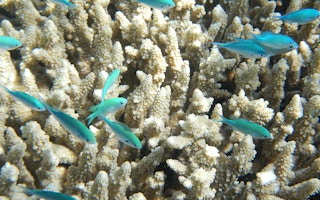Australian Prime Minister Malcolm Turnbull on Monday announced A$60 million in funding for an 18-month programme to help restore the health of the ailing Great Barrier Reef, but conservation and climate change activists have slammed the announcement as “nowhere near enough” to solve the problem.
Announced in a speech at the Australian Institute of Marine Science in Queensland, the commitment will see A$10.4 million (US$8.3 million) spent on increasing the number of vessels that control populations of the coral-eating crown-of-thorns starfish; A$36.6 million to incentivise farmers to reduce soil erosion and the amount of pollutants being washed into the ocean, and A$4.9 million to have more officers to monitor water quality and the health of the reef.
The government will also give the Australian Institute of Marine Science and the Commonwealth Scientific and Industrial Research Organisation (CSIRO) A$6 million to develop a research programme on how to restore the reef; this research will also look at how to tap on private investment to protect the UNESCO World Heritage site, which is also regarded as the largest living organism in the world.
In a speech in Townsville, Queensland, Turnbull said: “There is a lot of doom-saying about the Great Barrier Reef. It’s really important that we take up this challenge positively, recognising that just as we have with so many other areas, technology and science will provide the answers.”
Acknowledging the fact that the reef, which supports 64,000 jobs and a A$6.4 billion economy is an important economic and environmental asset, Turnbull added that the A$60 million investment was an example of the Coalition government’s commitment to the health of the Reef.
The funding announcement comes merely days after biologists warned that the Great Barrier Reef has already started to experience bleaching far earlier than expected this year, and that the problem is expected to worsen in the coming months.
Coral bleaching is a phenomenon that occurs when water temperatures rise, causing the colourful algae living inside corals to leave. Since these algae are an important energy source for the corals to photosynthesise, corals starve during a bleaching event, and can die if the bleaching happens repeatedly or for a long period of time.
This year’s bleaching follows back-to-back bleaching events in 2016 and 2017, something scientists studying the reef said was unprecedented.
“
The Prime Minister needs to exert leadership on climate change and the Reef. He is well aware of the problem but his solutions are so far woefully disproportionate to the problem.
Imogen Zethoven, director of the Fight for our Reef campaign, Australian Marine Conservation Society
Campaigners slammed the announcement as “meaningless” and woefully inadequate. Most of the criticism stemmed from the fact that while poor water quality and predator organisms such as the Crown of Thorns starfish are a threat to the reef, experts say rising ocean temperatures pose “the greatest challenge” to its survival.
Nikola Casule, climate and energy campaigner, Greenpeace Australia Pacific, pointed out in a statement that despite the fact that climate change—which is largely driven by burning fossil fuels such as coal for energy—Turnbull’s plan devoted no resources to reducing Australia’s reliance on fossil fuels or fighting climate change.
The government’s plan merely dealt with the symptoms of the problem rather than tackling the root cause, added Casule, noting that “rather than engaging in piecemeal exercises that ignore the biggest threat to the Reef, Malcolm Turnbull should place the interests of all Australians ahead of the profits of coal barons by embracing renewable energy and saying no to new coal projects, like Adani’s Carmichael coal mine.”
Imogen Zethoven, director of the Fight for our Reef campaign, Australian Marine Conservation Society (AMCS), echoed this sentiment.
“To seriously tackle the grave threat of climate change to the Reef, the federal government needs to make an urgent transition to renewable energy and rule out Adani’s Carmichael mine and all new coal mines,” she said.
Zethoven added that funding efforts to remove the Crown of Thorns starfish was not enough without dramatically scaling up responses to poor water quality.
Scientists also criticised the plan as one that would be ultimately ineffective in protecting the reef.
Jon Brodie, professorial fellow, ARC Centre of Excellence for Coral Reef Studies at James Cook University, told local media that programmes to remove the Crown of Thorns starfish had “minimal impact” on population numbers. He also pointed out that the government was not spending nearly as much as it should on this endangered ecosystem.
As AMCS’s Zethoven pointed out, the Queensland government has found that A$800 million a year is required over the next decade to improve the health of the reef.
“The government must get serious and make investment in this order of magnitude,” Zethoven said.
She added: “The Prime Minister needs to exert leadership on climate change and the Reef. He is well aware of the problem but his solutions are so far woefully disproportionate to the problem.”
Other recent multimillion dollar efforts by the Australian government to help the reef include a A$2 million challenge to scientists and businesses to come up with solutions to protect corals and the trial deployment of A$2.2 million giant underwater fans to cool the water around the reef.

















